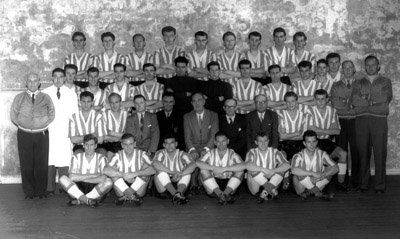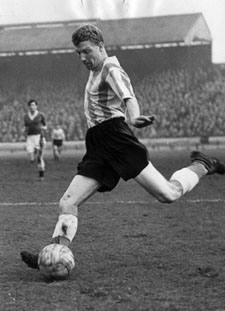
Sunderland AFC 1957/58
___________________________________________________
Sunderland were still reeling from the traumas of the summer when the new season kicked off on August 24th 1957. It was the first time Sunderland had began a new season with a new manager - Alan Brown. Brown was a fitness fanatic and made sweeping changes, not only to the training regime, but also the playing staff. Len Shackleton retired after the first game of the season, a home defeat by Arsenal. Since the end of the Second World War, no Sunderland player had featured in more games, or scored more goals. One of Brown’s first signings was to go down in the annals of Sunderland’s prolific and colourful history... that of the ‘King’ himself - Charlie Hurley. Brown used 26 players in all during the 57-58 season, including Roker greats Stan Anderson, Billy Bingham, Billy Elliott, Don Revie, and of course, Len Shackleton. But Sunderland’s history would take a turn for the worst. The opening eight games brought only one victory and four points, and right from the off we were on the rack. Right from the start the new manager gambled on youth and inexperience and at Molineux we got a taste of what it would bring via a 0-5 hammering. Interestingly Wolves had beaten Bolton 6-1 on the previous Wednesday. At Goodison Park in mid September we were defeated 1-3, most of it self-inflicted. Bad errors by the goalkeeper Bollands allowed Hickson two goals in the first six minutes. Then in the last six minutes Bollands redeemed himself by saving a penalty, Hedley had his name taken and Billy Elliott was carried off. It was that kind of season! Strangely enough we then beat Newcastle United at Roker Park 2-0, with goals from Revie and Grainger. In truth it should have been a rout and the Magpies were let off the hook. A 3-0 defeat of Luton Town, some revenge for recent thrashings, and a friendly return game against Maccabi, looked to have given Sunderland some confidence. A 0-7 defeat at Bloomfield Road against Blackpool marked the debut for one Charlie Hurley, destined to become the club’s player of the century, and his second game was another baptism of fire as we crashed 0-6 to Burnley. Quite what the youngster had done to deserve this is a moot point, but I guess he grew up quickly. For the Burnley game Sunderland made six changes, and selectors from the Scottish FA turned up to watch Sunderland’s left back Joe McDonald. He didn’t play and they left very disappointed.
One week later and Tottenham arrived on Wearside and escaped with only their second away point of the season. Then a rare away win at Birmingham, the first on our travels since our St Andrew’s victory in April. By now Sunderland were playing what became known as the deep Revie plan. Wearing the number 9 shirt the ex Man City player dropped deep, with O’Neill operating at inside left with Ambrose Fogarty at inside right. The trouble with the tactic was that Fogarty had been playing Irish League soccer just three weeks pre vious and he had little experience of the tactic. A 2-1 home success over Manchester City gave brief respite before an intriguing clash in a floodlit friendly match. Sunderland entertained the Italian giants Juventus at Roker Park; the game would end 2-0 to The Old Lady, with Enrique Sivori, then the world’s most expensive player, scoring both goals. He had originally cost £100,000 when signed from Argentine side River Plate, lining up alongside John Charles, one of British football’s few Italian export successes. Perhaps the poorest display of the season was reserved for the City Ground. It was our first visit to the stadium for 32 years and the 0-2 defeat was described as “pathetic” by the local journalists. A draw at home to Portsmouth saw teenage forwards Harry Godbold at outside left and Jack Maltby lead the line. The latter scored after 11 minutes having been flown over from Germany, where he was doing national service, especially for the game. Raich Carter, now silver haired, made an emotional return as manager of Leeds United on Boxing Day and he left a disappointed man after watching his side succumb 1-2. The FA Cup campaign begun and ended in the third round with Everton. The first game at Roker Park was a 2-2 draw, with manager Alan Brown a significant omission from the crowd, away watching a centre forward. The replay ended 1-3 and we were out. In truth it was a blessing because we needed league points not cup runs. It didn’t help when Fogarty was sent off. Then we travelled to Villa Park, and were on the wrong end of a 2-5 hiding. We were no longer the attraction we once were and for the second successive season we drew the lowest gate, just 14,000, to the famous arena. How the mighty had fallen. By now the Revie plan had been dropped and the centre forward was playing in a more traditional role, his deep lying position abandoned. Whilst we had a dreadful season we did at least have the satisfaction of preventing Newcastle United from defeating us. The second game in the “series” in the campaign ended 2-2. Our next game was at Kenilworth Road and we received yet another hammering from the Hatters, 1-7. So in three games we had succumbed 8-2, 6-2 and now this. That’s 21 goals conceded in three games. This was a bogey ground in every sense of the word. Earlier in the season the Luton player Turner had insisted, even after a 0-3 defeat, that “Sunderland are the worst team we have met in a long time.” This result seemed to prove him right. We suffered three successive defeats, before a testimonial reverse against a Stelling XI that included Sam Bartram the legendary Charlton keeper. Come the 8th March and 100 volunteers cleared the Roker Park pitch of four inches of snow. The game ended 3-3 and the crowd of some 18,000 was in sharp contrast to exactly 25 years ago when 75,118 had crammed in against Derby County. We then had a rarity, two successive victories, followed by two successive draws. But if we thought that we might be out of the mire we came crashing down to earth on 5th April at Roker Park, as Birmingham City walloped us 1-6. Successive defeats by the Manchester clubs left us staring down the barrel of a gun. Typically Sunderland were relegated on the last day of the season, despite defeating Portsmouth 2-0 at Fratton Park. Leicester City, their rivals for the relegation spot had won at Birmingham City 1-0. And just who was the Foxes’ manager? David Halliday, the former Roker scoring sensation. The City club lost 17 games, more than anyone in the division and conceded an incredible 112 goals. Still they stayed up and we went down, a tragedy. Sunderland slumped to 21st position in the First Division of the football league with a mere 32 points. The end was nigh and after 57 continuous playing seasons Sunderland dropped into the Second Division for the first time ever in the club’s footballing history, ending an amazing 68 years in the top flight. West Ham United and Blackburn Rovers were promoted. Sheffield Wednesday defeated Wolves to prevent the Molineux club from equalling the points record of 66, set by Arsenal 27 years previous. Funnily enough if Burnley had beaten Newcastle United by more than 40 nil, the next day at St James’ Park, Sunderland would have stayed up. The Turf Moor side “failed” in that particular quest! Arsenal would beat this record in 1988, having been a top flight ever present since 1919. |
 The 1957/58 season kicked off and in time would produce more Sunderland records - unfortunately the most number of goals conceded - 97. This campaign ended with relegation to the Second Division, and this unimpressive spell lasted until the early/mid 60s.
The 1957/58 season kicked off and in time would produce more Sunderland records - unfortunately the most number of goals conceded - 97. This campaign ended with relegation to the Second Division, and this unimpressive spell lasted until the early/mid 60s.  It was an unhappy return to the former Burnley man Alan Brown, who had played both Graham and Chilton, inexperienced full backs making only their third league appearance. We then drew with Preston at Roker 0-0, our third match running where we had failed to score. The 26th October and Sheffield Wednesday’s centenary celebrations at Hillsborough looked to be a damp squib as the red and whites led, with the referee looking at his watch for the final whistle. The Owls scored with the last kick of the game. When you are down, you are down as they say.
It was an unhappy return to the former Burnley man Alan Brown, who had played both Graham and Chilton, inexperienced full backs making only their third league appearance. We then drew with Preston at Roker 0-0, our third match running where we had failed to score. The 26th October and Sheffield Wednesday’s centenary celebrations at Hillsborough looked to be a damp squib as the red and whites led, with the referee looking at his watch for the final whistle. The Owls scored with the last kick of the game. When you are down, you are down as they say.